The difference your support made in 2022
January-April 2023
Breakthrough for Consepción in Mexico
Also inside this issue: Feature: Equipping human rights defenders on trauma and self-care In focus: A letter to you from Pastor Lorenzo and more...


The difference your support made in 2022
January-April 2023
Also inside this issue: Feature: Equipping human rights defenders on trauma and self-care In focus: A letter to you from Pastor Lorenzo and more...

Consepción has been living without water, electricity and sewerage services for six years. She and other Protestant Christian families in the village of El Encanto, Mexico, have been denied these services because they refused to take part in activities associated with the majority religion.
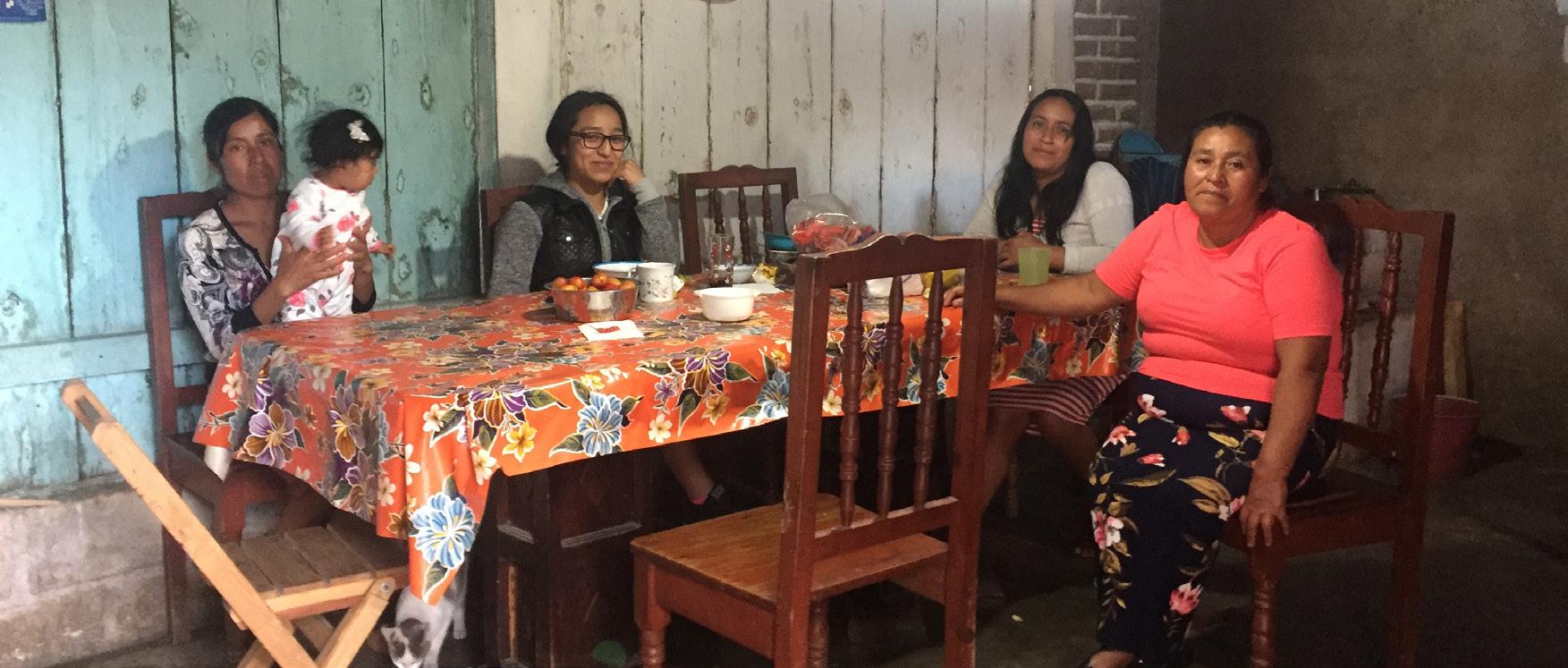
You’ve been campaigning for them alongside us, and last year we finally saw a breakthrough! This is just the beginning, but without the momentum of prayer, advocacy and campaigning this would not have been possible.
We met Consepción as part of the research for our ground-breaking ‘Let her be heard’ report. Launched in March 2022, this report told the stories of religious minority women from indigenous communities in Mexico. It was the first time that many of the women had been given the opportunity to share their stories – or, in fact, even been asked about their experiences.
Consepción was one of many women we interviewed whose water, electricity and sewerage services had been cut off: a violation of their human rights. She and her husband, Pastor Ranulfo, along with other Protestant Christian families in El Encanto, had refused to give in to pressure from the majority religion community in their village.
Faced with an impossible choice –your faith or your water supply –the families did not give in.
‘We are infinitely grateful’
In September last year, we learned that the municipal Public Prosecutor’s Office had received information regarding the ongoing human rights violations committed by the local authorities of El Encanto. The Office then reached out to a representative of the families, asking them to officially verify the information.
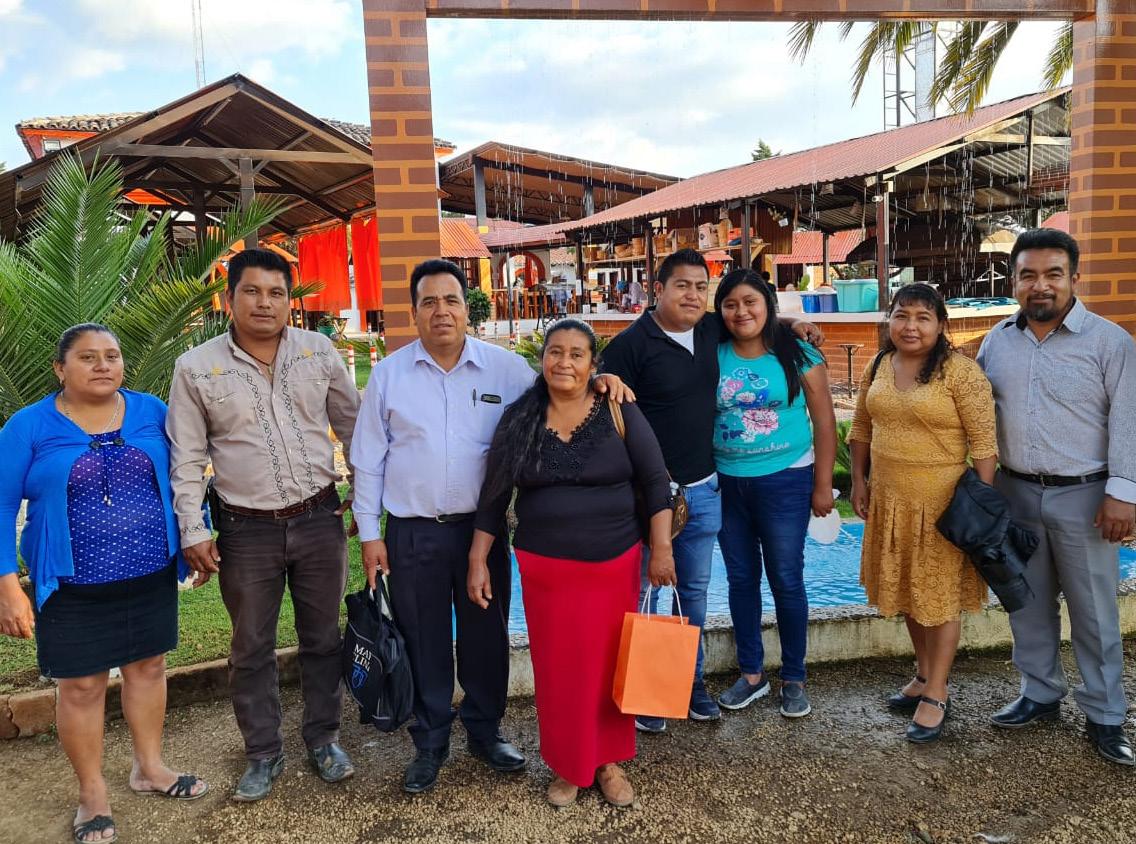
This recognition is a breakthrough in itself! It also gives hope for a proper investigation, that the local authorities will be held to account for their actions, and that the rights of the religious minority will be restored and protected.
And this all happened after hundreds of people like you wrote to the municipal authorities to demand action.
When we visited Pastor Ranulfo more recently, he told us that the municipal government – the authorities you’ve been writing to – have begun to
Women from Consepción’s church, El Encanto village
deliver water to the religious minority families every fortnight. Although the community’s access to running water has not yet been restored, this temporary solution means they no longer have to make a journey multiple times a day to collect water.
Pastor Ranulfo shared his thanks for your prayers, support and campaigning. He told us, ‘We are infinitely grateful for everything you are doing, and to all the brothers and sisters in different places – and especially those in the UK who are supporting and praying and sending
letters to…government authorities. Thank you very much; we really appreciate it.’
In December we learned that the community’s local assembly will hold a vote to decide whether to reinstate the families’ water, electricity and sewerage services. At the time of writing, we don’t know exactly when this vote will take place, but Pastor Ranulfo is expecting a meeting in the coming weeks.
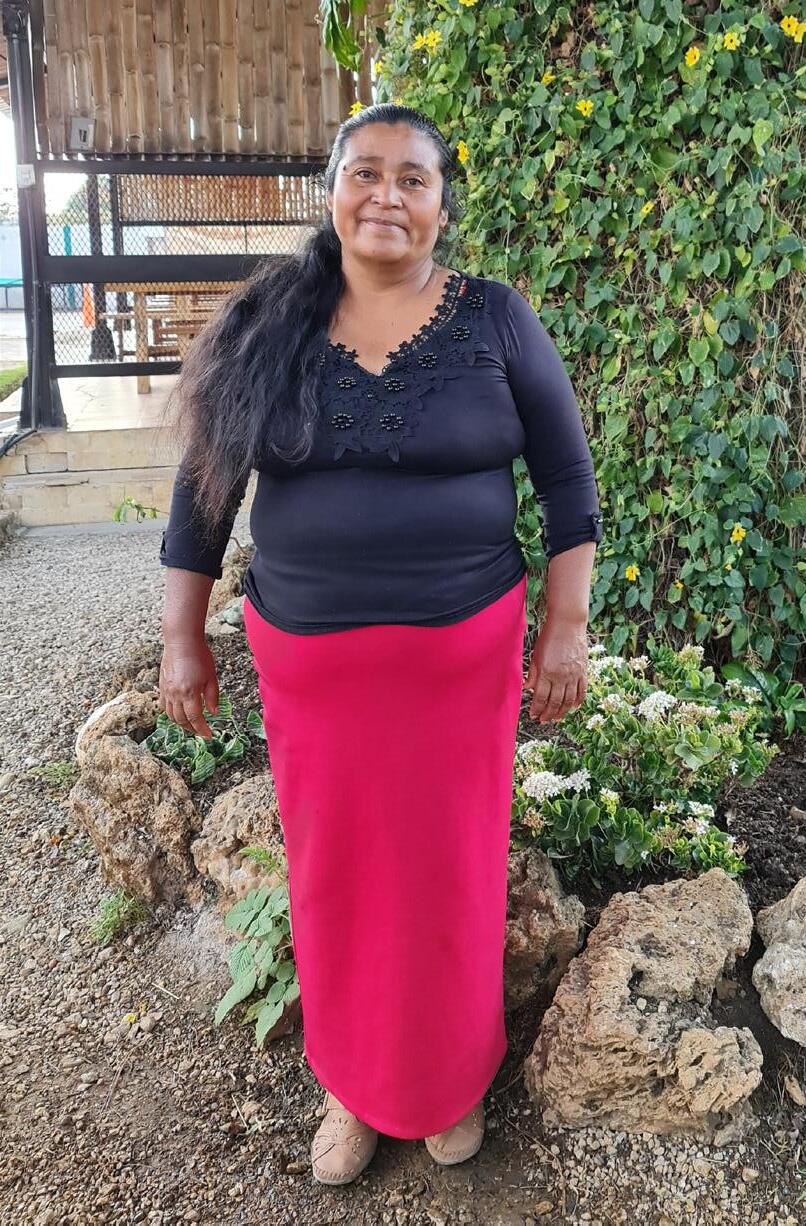
Decisions in the community are made by a show of hands by community members; in this case, more than 150 people representing the families who live in El Encanto.
And that’s why we need you to pray that the community will vote to reinstate the Protestant families’ basic services. Changing the hearts and minds of the community is no small task, but we believe in a God who makes the impossible possible; the families of El Encanto need your prayers to do just that.
■
‘I’ve been a Christian for 35 years and a cyclist for over 40, so this seemed like the perfect opportunity to combine the two and do something really worthwhile.’
Last summer, Graham Joyner was inspired to join the second ever Bike Pilgrimage for CSW and Release International – a sponsored cycle pioneered by long-time CSW supporter Robert de Berry. This epic ride across the UK’s south coast was a journey of prayer and fundraising for both charities. It’s a shining example of how one person’s actions can cause a ripple effect, motivating many more people to make a difference.
The first time Robert led the Bike Pilgrimage was in 2017, to mark his 75th birthday. Twenty-five cyclists joined for different sections of the route, while Robert and two others cycled all 920 miles. This time, however, Robert’s initiative had an even bigger impact: over 83 cyclists got involved, and together they raised £85,000 for CSW and Release International!
This is a staggering total and will help us to keep standing with everyone facing injustice because of their beliefs. Thank you if you were someone who sponsored the pilgrimage or shared their fundraising page – or were one of those amazing cyclists!
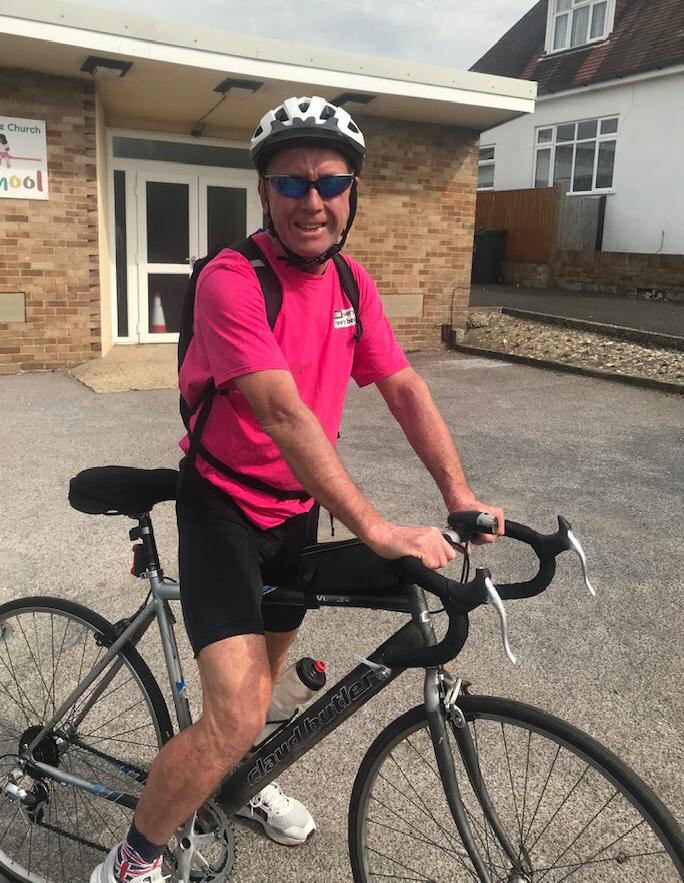
for the impossible for the religious minority familiesof El Encanto, using page 9 of the Prayer Diary.
Just as valuable were the countless prayers prayed along the way. The team led prayer times and shone a light on freedom of religion or belief at 42 churches along the route – with many people connecting with our work for the first time.
others
Graham told us why he decided to get involved in the 2022 Bike Pilgrimage:
‘I’ve long supported persecuted Christians, and since my daughter joined the CSW staff team I’ve learned much more about how important it is for Christians to speak up for people of all faiths and none, who are suffering because of what they believe.
I’m an avid cyclist and I love nothing more than touring the Sussex countryside on two wheels. I was looking for a new challenge when I heard about the Bike Pilgrimage. I only joined for a day but it was great to cycle with these wonderful people.’
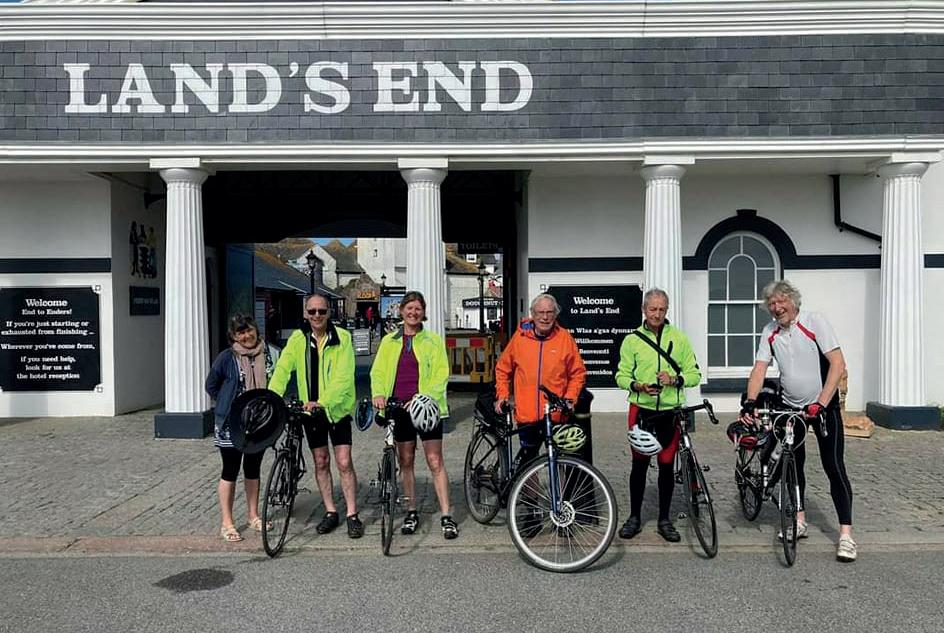
Four cyclists travelled the whole route between Kent and Cornwall, and three of them even went on to campaign with CSW later in the summer. Robert de Berry and Paul and Karien Downes all joined our ‘Free Pastor Lorenzo’ protest on 11 July, marking one year since the Cuban pastor was unjustly arrested while peacefully protesting. If Robert hadn’t extended the invitation to join the Bike Pilgrimage, perhaps our protest would have been smaller that day!
The Bike Pilgrimage was clearly a huge endeavour, but Robert didn’t do it alone. He mobilised people like Graham and many others to join him in making a difference – through praying, campaigning and speaking out, alongside the all-important fundraising.
Who knows how many people were touched by a story they heard at one of the prayer meetings, and felt inspired to pass it on? Maybe it lit a spark for justice in someone and stirred them to take action.
Together all these people have made an impact that will carry on, long after the pilgrimage crossed the finish line.
83 cyclists
42 prayer meetings
Are you thinking of taking on a new challenge this year? You don’t have to cycle for miles to do something meaningful!
Challenge 1: Tell one person about the work of CSW. It could be something you’ve learnt in Response magazine, or simply why you stand with everyone facing injustice because of their beliefs.
Challenge 2: Gather a small group to pray or take action. You could use the prayer diary or write letters through Connect & Encourage.
Challenge 3: Be a fundraising hero. Try something more challenging to raise money for CSW. Visit csw.org.uk/fundraise for inspiration!
23 volunteer drivers
£85,000 raised
We are hugely grateful to Robert, Paul, Karien, Simon Beber and Roger Spinks, who rode all or most of the route, and everyone else who took part in the Bike Pilgrimage in 2022. Thank you so much!
On his 51st birthday, Pastor Lorenzo wrote a letter from his prison cell in Cuba, addressed to CSW staff and supporters. We wanted to share it with you because many of you have been praying and campaigning for this Cuban church leader, ever since he was unjustly imprisoned amid the peaceful protests of 11 July 2021.
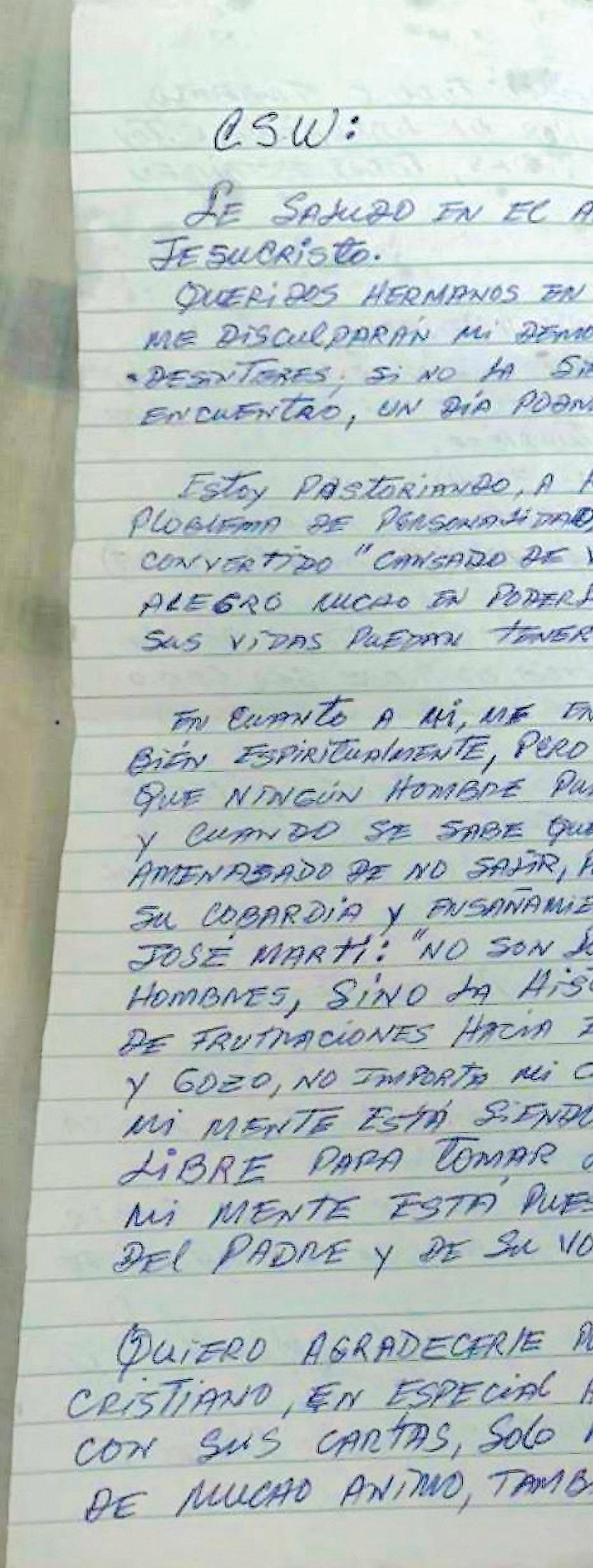
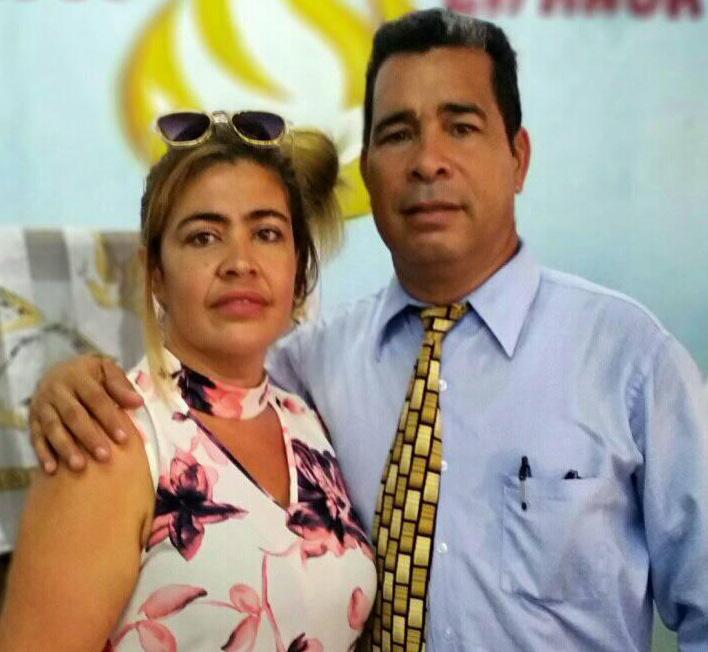
We hope you are encouraged and blessed by this beautiful letter. Thank you for everything you are doing!
Dear CSW, I greet you in the love of our Lord Jesus Christ.
I ask you to excuse me for my delay in writing back to you; it is not because of a lack of interest, but the circumstances where I find myself, which one day I will be able to explain in detail.
I am pastoring rebellious men (here in prison) with serious personality problems; as one new convert told me, ‘tired of living and afraid of dying’; it makes me very happy to be able to help them laugh again and that their lives can have meaning in Jesus Christ.
In regard to myself, my health is improved, and I am well spiritually, but prison is very hard.
I don’t think that any man can get used to this place, and even more so when one knows that one is here unjustly; and threatened with never being able to leave, due to the vile fear of a few, their cowardice and cruelty; but I am not afraid.
Instead of experiencing frustration towards them, I have contentment, peace, joy, no matter the circumstances that surround me.
My mind is being renewed by Christ. I am free to make the right decisions, because my mind is set on the Spirit and I depend on the Father and His will. I can trust in Him!
I want to thank you, through this letter, for your support and Christian love, especially my brothers and sisters who encourage me with their letters. They (the guards) only gave me eight, but they were very encouraging. My wife has also received letters.
Thank you very much; I recognize all the work you are doing for my release.
I am very grateful for your lives; you are all in my prayers.
A Cuban, Félix Valera, the first one who taught us to think, said: ‘Never say that a just and merciful God has desired to deprive men of the rights that He Himself gave them by nature.’ God is justice (Isaiah 30:18).
Well, I bid you goodbye with the promise of God (Isaiah 51:14-15 NLT): ‘Soon all you captives will be released! Imprisonment, starvation, and death will not be your fate! For I am the Lord your God, who stirs up the sea, causing its waves to roar. My name is the Lord of Heaven’s Armies.’
Pastor Lorenzo and MaridilegnisWe’ve been raising awareness, campaigning and advocating for Pastor Lorenzo since he was unjustly arrested in July 2021. And you rose up in an amazing way to support him and his family – refusing to stay silent about the unjust targeting of the family. While we haven’t seen the victory of his unconditional release yet, we give thanks for the impact our advocacy, awarenessraising and campaigning have had.
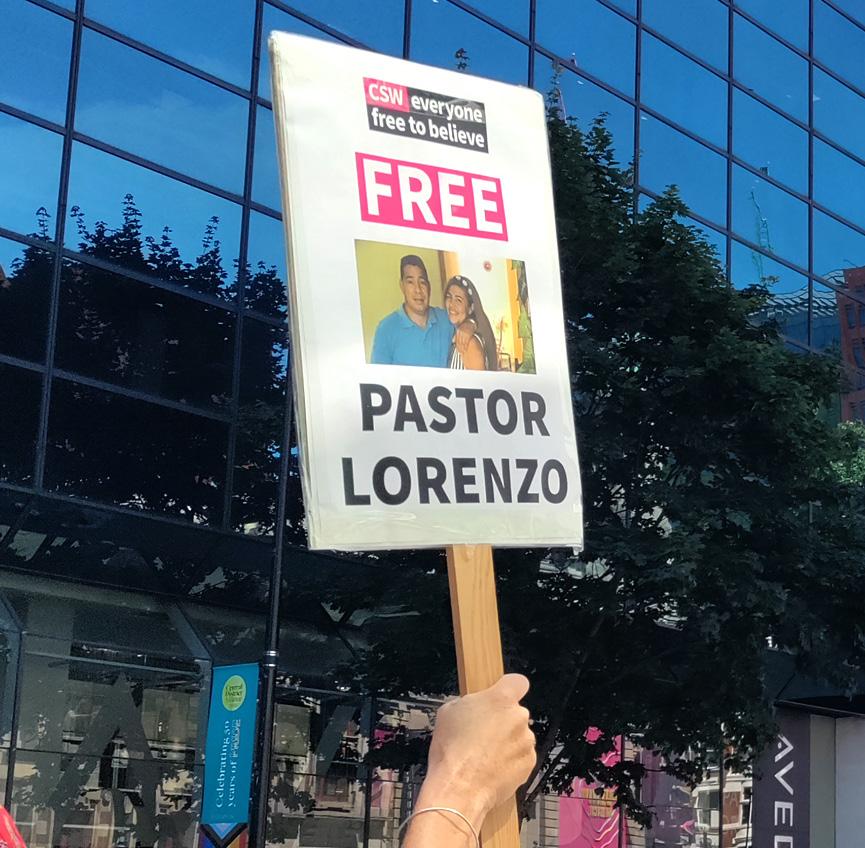
Here’s a snapshot of what we’ve achieved together…
• Thousands of supporters like you in the UK have campaigned for Pastor Lorenzo’s release! The Cuban Ambassador in the UK has received over 5,000 emails about the case.
• We have held two protests outside the Cuban Embassy in London, and encouraged people to write letters of hope to Pastor Lorenzo in prison, as well as to his family.
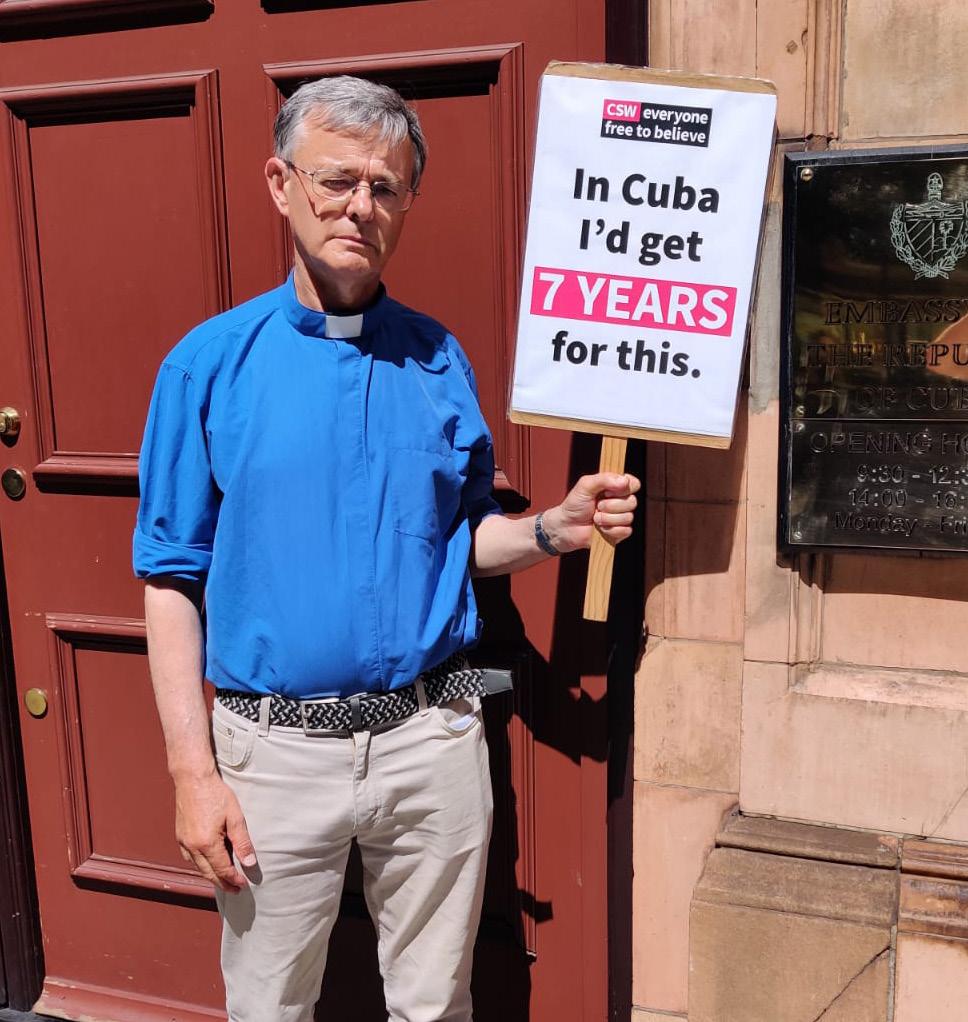
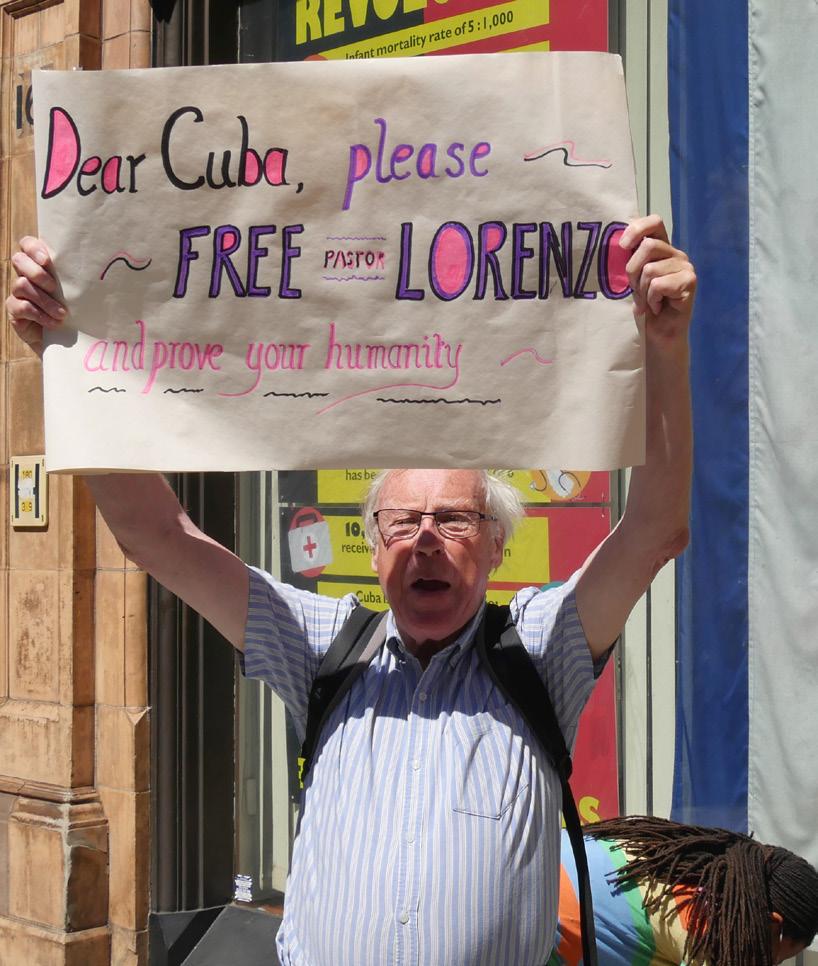
The UK All-Party Parliamentary Group for International Freedom of Religion or Belief published a statement condemning the Cuban government’s targeting of religious leaders, including Pastor Lorenzo, as a result of our advocacy.
• We’ve provided information about the case to several UN experts working on human rights issues, which resulted in five UN Special Procedures contacting the Cuban government.
• We’ve continued raising his case regularly at the UN, including giving a statement at the Human Rights Council calling for Pastor Lorenzo’s unconditional release.
As a result of our ongoing media work, Pastor Lorenzo’s case has been covered in over 28 different media outlets using our case materials. His story has been told across blogs, TV interviews, podcasts and radio interviews.
• We briefed European diplomats, which led to the EU Delegation raising Pastor Lorenzo’s case directly with the Cuban authorities. The Embassy of the Netherlands also later hosted David, Pastor Lorenzo’s son, at a meeting with European diplomats.
• We shared our briefings with the European Parliament’s political groups ahead of its debate and vote on an Urgency Resolution on Cuba, which called for Pastor Lorenzo’s release.
• As a result of our advocacy, senior officials in a number of embassies in Havana are in direct contact with Pastor Lorenzo’s family.
• Pastor Lorenzo has been added to the US Commission on International Religious Freedom’s (USCIRF) FoRB Victims List, after we briefed staff on his case.
• Senior State Department officials have raised his case, including on social media.
Robert de Berry Rev Paul McVeagh■ If you’ve ever caught a plane, you would have heard the cabin crew’s instructions to ‘put on your own oxygen mask before helping others’. It makes sense that, in a dangerous situation, you can do a better job of helping others if you also take care of yourself.
This is why we run workshops around the world on various aspects of freedom of religion or belief, including training human rights defenders (HRDs) on trauma and self-care. These people experience the trauma of the context in which they live, alongside those whose rights they are defending, and have little or no time to take care of themselves.
Your support is helping equip human rights defenders and others to recognise the signs of trauma and the importance of self-care, enabling them to create holistic solutions for victims their communities.
Last year we were training human rights defenders in the Africa and Middle East regions on how to deal sensitively with trauma victims whose rights they are defending, and at the same time how to be aware of any symptoms of anxiety, vicarious trauma or depression they may be experiencing themselves, and address them.
The HRDs work in countries wracked by violence, with high levels of collective trauma. In the most difficult circumstances, these courageous people have decided to dedicate their lives to fighting for the rights of others – including the right to freedom of religion or belief.
‘The importance of listening to our body and understanding what some symptoms mean and what causes them is priceless knowledge. Now I know what this means and how to react and what to do to improve my mental health. It was a new topic to me, and it completely changed my thinking in a very positive direction.’
– A participant in our training
This new perspective means that they are able to care for the wellbeing of those whose rights they defend, while being the most effective they can be when representing them, having built their own resilience.
Many participants told us how good it was to have training that considered their own wellbeing as human rights defenders, and how they might be impacted by the distressing nature of their work. Several said that this training was completely unique:
‘This is the very first time we feel someone cares about us. We put our lives in danger, facing the government and the security services, and we never think about ourselves. This is the first time we stopped and thought about ourselves. Our mental health is really affected by the work we are doing.’
When we followed up with the participants afterwards, they told us how what they’d learned was changing their work. Ibrahim* took on the case of some young men who had been arrested, and had had their heads forcibly shaved by police.
Ibrahim told us, ‘I would have given no attention to this act [having their heads shaved] if I didn’t have the training. But as a trained lawyer on mental health issues, I was aware of the [psychological] damage this act caused them. I gave them enough time to express their anger and frustration – some of them cried even – and then advised them to meet a psychologist which I referred them to.’

'This is the very first time we feel someone cares about us.'
Other participants admitted that they had in the past dismissed trauma victims who struggled to describe their ordeal in a coherent manner. Maria* said, ‘I didn’t think they were serious. I needed the information, and if they didn’t want to give it to me, I moved on.’
But after our training, Maria and others realised that their clients’ difficulty in relating events coherently is a symptom of genuine trauma; and they decided that in future they would plan to interview their clients in several sessions. Multiple sessions would give the victims time to talk about the impact their experiences had had on them, as well as to pass on the facts of the case to enable their lawyer to do the legal work.
We have been hard at work on a training project tailored to the specific issues in Pakistan.
Cases involving the abduction, forced conversion and forced marriage of Christian and Hindu girls have increased in recent years, particularly in Punjab and Sindh provinces. Girls from ‘low’ caste Hindu communities are particularly at risk, and many of those kidnapped are forcibly
converted to Islam and married off to their abductors.
There are already laws in place to protect women and girls, but many people are unaware of them, and are sometimes even unaware of their right to not be forcibly converted or forcibly married. We decided to address this gap.
Madhu* is one of our key contacts in India, whose courageous research and reporting has strengthened our advocacy on this key country. We spoke to Madhu to find out more about what she does, and what she sees as the key challenges for India.
Please could you explain to us what you do in your work for freedom of religion or belief?
What are the main challenges you experience?
In October 2021 we began a fourmonth project with a local partner, the Cecil & Iris Chaudhry Foundation. The project trains senior human rights activists in raising awareness among the Christian and Hindu communities on the existing laws and safeguards for women and girls.
We know from our work in the Africa and Middle East regions that this kind of training can have a significant, long-lasting effect, so we are looking forward to seeing how this project will change lives in Pakistan.
All this vital, transformational work is only possible with your support. Thank you so much!
*Name changed for security reasons
I report on violence, hatred and discrimination against minorities in India, mainly Muslims and Christians. I also write articles explaining communal issues – the beliefs and ideologies that separate various religious, ethnic and social communities, which can sometimes lead to conflict.
What successes have you seen?
There was a lot of feedback on one of my articles about the interplay between caste [hereditary social class] and religion in India. Several people responded saying they had never really understood the root of the problem until then. I believe that was a small success because people can’t help or address an issue without understanding the background.
I’ve also learnt that CSW gets referenced at the House of Commons in debates on freedom of religion or belief, like the one that took place on 24 February this year.
One of the main challenges I’ve faced is being able to verify information. Very few complaints are registered with the police, and in some cases, the police are also involved indirectly in the crimes. So it becomes difficult to get official confirmation.
There was one particular murder of an evangelist recently, where no one in the village was willing to report the crime or speak about it publicly; the witnesses spoke only on condition of anonymity, so there were no reports, no other official records to confirm.
How do you think freedom of religion or belief in India will change over the next ten years or so?
Freedom of religion or belief in India is at a very crucial stage. We are living in a time where the government is blatantly stripping minorities of their freedom, through new laws such as anti-conversion laws, through cancellation of Foreign Contribution Regulation Act (FCRA) licences [which allow organisations to receive
This kind of training can have a significant, long-lasting effect.
donations from abroad], or by turning a blind eye to the increasing number of hate crimes against minorities.
There is also a false notion of fear being spread amongst Hindus that their religion is under threat. I believe that this is the main reason for increasing disharmony between Hindus and minorities, mainly Muslims and Christians. It is very evident, even in conversations I’ve had and heard of with Hindu friends and acquaintances, how their mindset is changing. They genuinely feel that Muslims are dangerous and Christians are out to convert, and that their [Hindu] religion will soon vanish if they don’t fight back.
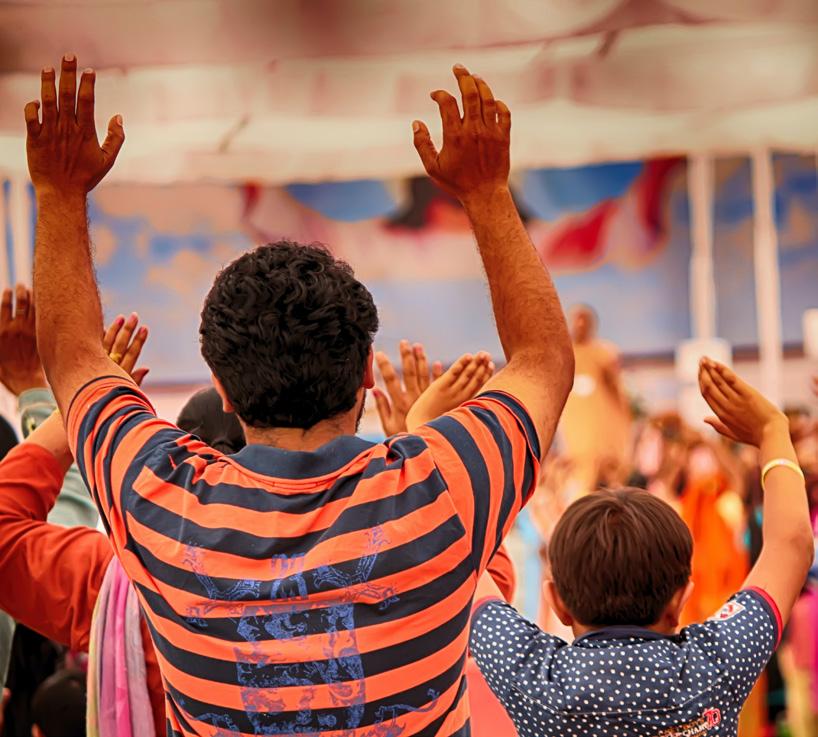
The most dangerous truth, however, is the fact that these thoughts are pushed even by ministers of the ruling Bharatiya Janata Party (BJP).
The 2024 general elections could set the tone for freedom of religion or belief in India over the next few years. The opposition parties have understood the danger that our democracy is in. There are attempts being made to forge a united front to fight against the divisive politics of the ruling party. I believe, at least to a large extent, the outcome of the elections will determine where the country is headed.
Another huge challenge is the threat to freedom of the press. Obviously any democracy thrives when the press is allowed to do their job. That has become an extremely dangerous mission in India over the last few years.
Several journalists have been arrested with false evidence planted against them; some have been killed; some have been stopped from leaving the country. Every attempt is being made to silence the voices of those trying to speak out.
* Name changed for security reasons
Pray for Madhu’s continued protection, and that she will be encouraged by seeing her work bear fruit in this challenging environment.
• Read some of Madhu’s writing at forbinfull.org/category/asia/ india
■ Do you remember last January's issue of Response? It featured an article called ‘Four years at the UN’, which unpacked how we’d been making the most of our UN accreditation since gaining it in 2017. Now, another year on, we’re still amplifying voices in this international arena. Our UN Officer Claire Denman reflects on some key moments from 2022.
‘One of the biggest highlights for me has been the return to in-person meetings,’ says Claire. ‘Being face-toface facilitates a depth of discussion that you may not otherwise have.’
For the first time since the COVID-19 pandemic began, Claire was able to travel to Geneva for two sessions of the Human Rights Council, in March and September.
She contributed to numerous interactive dialogues on countries of concern; Iran, North Korea and Nicaragua, to name a few. Claire presented many oral statements, as she did throughout the pandemic, but much more of her work took place on the ground:
‘This was immensely valuable because you’re able to build a better rapport in person. I believe this year has strengthened our ability to equip policymakers and diplomats, as well as opening up opportunities to collaborate with civil society actors in our advocacy.’
Every interaction – whether in a meeting room or beyond – is an opportunity to raise the profile of CSW and the people we’re working for. ‘Even informal chats over lunch have helped invest in relationships, which can be beneficial for future advocacy initiatives. For example, when someone is arbitrarily detained and we need to mobilise swift action, we already have strong relationships and networks in place to help facilitate this.’
In 2022 our specific expertise continued to set us apart at the UN, as one of the leading voices on the right to freedom of religion or belief in China; for example, we were invited to speak at several UN events as the expert panellist.
CSW also provided the UN High Commissioner’s office with information ahead of her visit to China in May, including places which could be visited and a set of benchmarks for freedom of religion or belief.
Christians worship in India. Unsplash/Tofin CreationsAlongside these successes came some disappointments. In September, the Human Rights Council failed to enable a procedural debate on human rights in China’s Xinjiang Uyghur Autonomous Region (XUAR) to take place in 2023. This debate would have facilitated some muchneeded scrutiny of one of the most severe human rights crises in the world today.
Yet we still recognise the good the UN can achieve when it works well. ‘We remain determined to persist until justice is served for the people of the XUAR and across China as a whole,’ says Claire.
2022 saw the appointment of Professor Nazila Ghanea as the new Special Rapporteur on freedom of religion or belief. ‘Professor Ghanea
has long been an advocate for the right to freedom of religion or belief, so we’re looking forward to working with her,’ says Claire.
It’s also our hope to see places like Tigray and Myanmar/Burma receiving the international attention and intervention they urgently need. Benedict Rogers, our Senior Analyst for East Asia, described the situation in Myanmar as being like ‘Ukraine in slow-motion, and yet almost no one is speaking about it.’ The horrific war in Ukraine has rightly received a robust response from the UN, demonstrating that powerful countries like Russia are not above scrutiny. This gives us hope that concrete action can also be taken to stop the appalling human rights abuses in Myanmar, Tigray, China and elsewhere.
As we’ve said before, government systems rarely change for the better overnight. Thanks to your support, Claire and our Advocacy team can keep calling the world to action through the mechanisms of the UN. Let’s keep building momentum in 2023 as we pursue justice together!

Good news: in September the General Prosecutor in Central Darfur dismissed a case against four Christians who had been charged with apostasy (leaving a religion; in this case, Islam).
The men were arrested twice in June and told that they would face the death penalty unless they renounced their faith and agreed not to pray, share their faith or participate in Christian activities. They refused and were charged with apostasy – even though it was decriminalised in 2020.
The dismissal of these charges is something to celebrate; however, these men should never have been arrested or subjected to inhumane treatment. This case illustrates the deteriorating human rights situation in Sudan since the 2021 military coup.
Pray for the next session of the UN Human Rights Council, 27 February–31 March 2023. Put it in your diary to pray for fruitful discussions about freedom of religion or belief for all.
On 22 September 2022, four students were expelled from a private school in Punjab for being Ahmadi Muslims.
In the document justifying their expulsions, the principal used a common slur against the Ahmadiyya community and gave no other reason for their withdrawal from education.
Pakistan’s Ahmadiyya community is the most institutionally and
constitutionally oppressed religious group in the country. They are categorised as ‘non-Muslims’ under various laws and face significant restrictions, alongside hate speech and violence from extremist elements within Pakistani society.
For 15 days in August, security forces blockaded the Bishop of Matagalpa, Rolando Álvarez, inside the Curia in Matagalpa – preventing him from leaving to officiate Mass. He was then placed under house arrest on 19 August.
Seven others, including priests, lay leaders and seminarians, who were detained alongside Bishop Álvarez were moved to a police complex, falsely accused of attempting to organise violent groups to destabilise the government.
The Nicaraguan government has cracked down on anyone it views as critical of the current regime. The Catholic Church has been targeted extensively, with the forced closure of its affiliated charities, private universities and aid organisations.
As of December 2022, Bishop Álvarez is still under house arrest and has been charged with crimes of conspiracy. Seven of the priests and lay leaders that were with him are all in a maximum security prison.
Claire at the United Nations, Geneva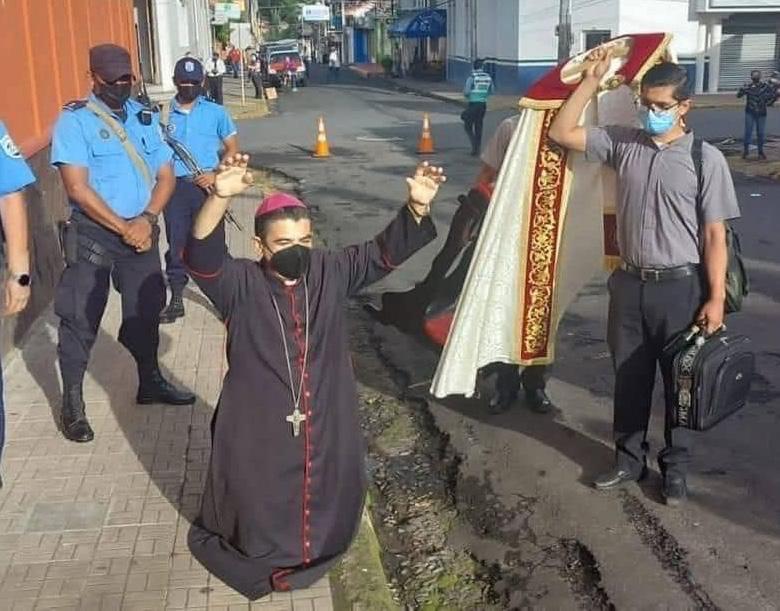
 Bishop Alvarez, Nicaragua.
Bishop Alvarez, Nicaragua.